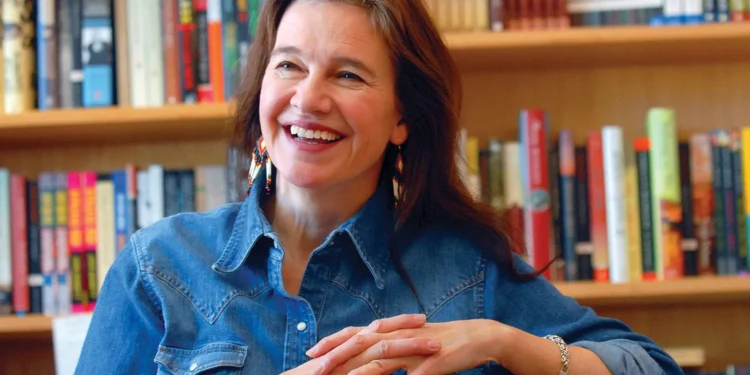Facts about Louise Erdrich Of American Poet
Louise Erdrich, a prominent American author and Chippewa Indian from the Turtle Mountain Band, has made a reputation for herself in literature with a collection of work that captures the spirit of Native American culture. Erdrich was born in Little Falls, Minnesota, on June 7, 1954. Her stories are infused with the cultural depth of her Ojibwe ancestry, navigating the wide-ranging terrain of customs, identity, and the intricate interactions between the lives of the indigenous people and the mainstream American community. The goal of this in-depth biography is to explore Louise Erdrich’s complex life, influences, and literary accomplishments.
Early Life and Cultural Roots:
Louise Erdrich’s upbringing acted as the rich soil in which her passion for writing would grow. She was raised in Wahpeton, North Dakota, where her mother’s Chippewa ancestry and her father’s German-American background came together to form one universe. Erdrich’s identity was shaped by the distinct junction of these cultural threads, which also had a significant impact on her later works.
The colorful tapestry of Native American art was on display in the tiny arts and crafts store owned by her parents, Ralph and Rita Erdrich. The family’s livelihood was supported by the business, which also introduced Louise to the complex beauty and storytelling customs inherent in indigenous art. Her early exposure to her ancestors’ artistic expressions would subsequently reverberate in the vivid visuals and intricate storyline of her writing.
Education and Activism:
Erdrich’s educational journey further fueled her passion for storytelling and activism. At Dartmouth College, where she pursued a Bachelor of Arts in English with a focus on creative writing, she encountered the realms of literature and politics. The intersection of these realms would become a defining feature of her life and work.

In addition to her academic pursuits, Erdrich was actively engaged in political activism during her college years. She advocated for Native American rights and social justice, laying the groundwork for the social consciousness that would permeate her later writings. It was also during her time at Dartmouth that she met Michael Dorris, an author and anthropologist, with whom she would later share both her personal and professional life.
Marriage to Michael Dorris and Literary Collaboration:
In 1972, Louise Erdrich married Michael Dorris, and the union became a literary partnership that extended beyond the boundaries of personal life. Together, they would collaborate on various projects, with both authors contributing to each other’s work. The union also included the adoption of six children, three of whom were adopted.
Also Read-
- Facts about Dylan Marlais Thomas Of English Poet
- Facts about Gerard Manley Hopkins Of English Poet
- Facts about John Crowe Ransom Of American Poet
The collaborative efforts of Erdrich and Dorris were not limited to their family. In 1981, they co-authored “The Crown of Columbus,” a novel that explored themes of cultural identity and colonialism. Their partnership was marked by shared interests in literature, anthropology, and a commitment to raising awareness about Native American issues.
Legacy:
- Exploration of Native American Experience: Erdrich’s novels delve into the complexities of Native American life, providing a nuanced portrayal of culture, identity, and the impact of historical and social forces. Her works often center on the Ojibwe people and their communities, offering readers insights into Native American perspectives and experiences.
- Creation of a Literary Universe: Similar to William Faulkner’s Yoknapatawpha County, Erdrich has created her own fictional universe centered around the community of characters in and around the fictional town of Argus, North Dakota. This interconnected narrative landscape allows her to explore multiple generations and diverse experiences within the same cultural context.
- Award-Winning Novels: Erdrich has received critical acclaim and numerous awards for her novels. “Love Medicine” (1984), her debut novel, won the National Book Critics Circle Award. Subsequent works like “The Round House” (2012) and “The Plague of Doves” (2008) have also received prestigious literary honors, contributing to her legacy as a celebrated author.
- Cultural Preservation and Representation: Erdrich is recognized for her commitment to preserving Native American cultures and languages. Through her works, she addresses the challenges faced by Indigenous communities, including the impact of historical trauma, displacement, and cultural assimilation. Her writing serves as a form of cultural representation, countering stereotypes and amplifying the voices of Native Americans.
- Intersectionality and Multigenerational Narratives: Erdrich’s novels often explore intersectionality, examining how factors such as gender, ethnicity, and cultural identity intersect and influence characters’ experiences. Additionally, her multigenerational narratives provide a comprehensive view of the enduring effects of historical events on individuals and communities.
- Engagement with Social and Environmental Issues: Beyond cultural themes, Erdrich’s works address contemporary social and environmental issues. Her novel “Future Home of the Living God” (2017) incorporates themes of climate change and environmental degradation, showcasing her ability to connect literature with pressing real-world concerns.
- Bookstore and Literary Community: In 2013, Erdrich, along with her sister, opened Birchbark Books in Minneapolis, an independent bookstore that focuses on Native American literature. The bookstore has become a hub for literary events and community engagement, furthering Erdrich’s impact on the literary scene.
- Influence on Contemporary Literature: Louise Erdrich’s contributions to literature have influenced contemporary writers, particularly those exploring themes of identity, cultural diversity, and social justice. Her unique narrative style and dedication to portraying Native American experiences have paved the way for a more inclusive and diverse literary landscape.
- Continued Literary Output: Erdrich’s prolific literary career spans numerous novels, short stories, and poetry collections. Her consistent output ensures that readers have a substantial body of work to engage with, and her exploration of new themes and narratives adds to the depth of her literary legacy.
- Educational Impact: Louise Erdrich’s works are frequently studied in academic settings, contributing to the understanding of Native American literature and contemporary American fiction. Her influence extends to literature courses, where her novels are examined for their cultural, historical, and literary significance.
Major Works:
- “Love Medicine” (1984): Erdrich’s debut novel, which won the National Book Critics Circle Award. It is the first book in her interconnected series of novels.
- “The Beet Queen” (1986): A novel that follows the lives of the eccentric and unforgettable characters of the Kashpaw and Lamartine families.
- “Tracks” (1988): Set in North Dakota during the early 20th century, this novel explores the tensions between the Ojibwe and the white settlers.
- “The Bingo Palace” (1994): Another installment in Erdrich’s series, delving into the lives of the interconnected families in and around the fictional town of Argus.
- “Tales of Burning Love” (1996): This novel combines elements of romance, humor, and tragedy as it follows the lives of different characters affected by a train accident.
- “The Antelope Wife” (1998): A novel that weaves together the lives of two families, exploring themes of love, loss, and cultural identity.
- “The Last Report on the Miracles at Little No Horse” (2001): The story of Agnes DeWitt, a Catholic nun who, over the course of decades, assumes the identity of a priest while serving the Ojibwe community.
- “The Master Butchers Singing Club” (2003): Set in the aftermath of World War I, this novel follows the life of German immigrant Fidelis Waldvogel as he establishes a new life in North Dakota.
- “Four Souls” (2004): Part of the “Love Medicine” series, this novel focuses on the character of Fleur Pillager and her quest for revenge.
- “The Painted Drum” (2005): A standalone novel that explores the journey of a unique Ojibwe drum through time, connecting different characters and generations.
- “The Plague of Doves” (2008): A novel that intertwines the history of a small North Dakota town with the consequences of a crime committed in the past.
- “Shadow Tag” (2010): A novel that delves into the complexities of a troubled marriage and the impact of secrets on a family.
- “The Round House” (2012): Winner of the National Book Award, this novel follows a young Native American boy seeking justice for his mother, who has been the victim of a violent crime.
- “LaRose” (2016): A novel centered around a tragic accident and the Ojibwe tradition of restitution, exploring themes of grief, justice, and redemption.
- “Future Home of the Living God” (2017): A dystopian novel that imagines a future where evolution has started to reverse, told through the diary entries of a pregnant woman.
- “The Night Watchman” (2020): Inspired by Erdrich’s grandfather’s life, this novel explores the impact of legislation on Native American communities in the 1950s.
1954 – June 7: Louise Erdrich is born in Little Falls, Minnesota, to parents Ralph Erdrich and Rita Gourneau Erdrich.
1972: Louise Erdrich marries Michael Dorris, an author and anthropologist. The couple would go on to adopt six children, and their partnership would extend to collaborative literary projects.
1976: Erdrich graduates from Dartmouth College with a Bachelor of Arts in English.
1981: Erdrich and Dorris co-author “The Crown of Columbus,” a novel exploring themes of cultural identity and colonialism.
1984: Erdrich publishes her debut novel, “Love Medicine,” which receives critical acclaim and establishes her as a significant voice in American literature.
1986: “The Beet Queen,” another novel set in the fictional world of her debut, is published.
1988: Erdrich’s novel “Tracks” is released, exploring the clash of cultures between Native Americans and white settlers.
1994: “The Bingo Palace,” another novel in the Love Medicine series, is published, exploring themes of tradition and modernity.
1997: Tragedy strikes as Michael Dorris dies by suicide, marking a challenging period in Erdrich’s personal and professional life.
2002: Louise Erdrich marries Michael Ondaatje, a Canadian author. The marriage is later dissolved.
2012: “The Round House” is published, winning the National Book Award for Fiction. The novel explores issues of justice and sovereignty on a Native American reservation.
2016: “LaRose” is published, delving into themes of justice, forgiveness, and familial relationships in a Native American community.
2020: Erdrich’s novel “The Night Watchman” is released, inspired by the life of her grandfather and addressing issues of Native American history and resilience.
















